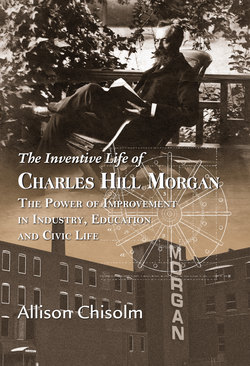Читать книгу The Inventive Life of Charles Hill Morgan: The Power of Improvement In Industry, Education and Civic Life - Allison Chisolm - Страница 5
На сайте Литреса книга снята с продажи.
One Cloth, Paper, Wire & Steel
ОглавлениеLate 19th century set of drafting tools
THE PACKAGE HAD ARRIVED. Charles Hill Morgan leaned forward at a table and opened the velvet-lined case with excitement. One by one, he laid out his new acquisitions: a double point shaft compass, pencil and ink points, an excellent German pen, 3-inch dividers, a complete set of 3-inch steel bows, and eight regular pens with a variety of nib sizes.
The 22-year-old hazel-eyed draftsman sat back, stretched his long legs, and surveyed with satisfaction this major investment in the tools of his trade. He then opened his diary for April 20, 1853, and recorded his purchases in his methodical and steady hand, totaling $22.72 for the drafting tools, plus express shipping to his boarding house in Lawrence, Massachusetts. The price represented more than a few weeks’ wages from the Lawrence Machine Shop, part of the vast Essex Company manufacturing enterprise on the Merrimack River.
Despite his youth, he had travelled far to reach Lawrence. Born in Rochester, New York in 1831, Charles Morgan briefly lived in Michigan as his parents followed the westward expansion of the young nation’s canals. When he was eight years old, however, the family migrated back to central Massachusetts, where they had longstanding roots.
The Morgan family eventually settled in Factory Village (later named Clinton), where Charles spent his formative years. There his parents helped to build a church and passed on to their son their deep-seated faith. Charles learned literacy and numeracy in public schools and at a local academy, but he was introduced to drafting while a teenager working as a mechanic in the coachlace mill of Clinton. He then honed his practical knowledge of machinery and perfected his drafting techniques while working on equipment for mills, looms, and steam engines in Massachusetts and Pennsylvania.
Charles’s mastery of his drafting tools was so well respected by 1854 that when William T. Merrifield asked the Lawrence Machine Shop to design a steam engine installation to power shared facilities for small manufacturers in Worcester, it was Charles Hill Morgan who drew up the plans for the foundation.
From such humble beginnings, Morgan’s technical skills and business acumen launched his varied career as an innovator, entrepreneur and civic leader. He ran a paper bag manufacturing business in Philadelphia in the 1860s, managed the world’s largest producer of barbed wire in Worcester from the mid-1860s to mid-1880s, and then founded his own rolling mill company in Worcester in 1888. He held several important patents and tenaciously defended his rights to the commercial use of this intellectual property. Morgan’s success was initially due to his ability to use a draftsman’s professional-grade compass to make precisely centered measurements. But Morgan himself attributed his success in life to a strong moral compass, centered around church, family and service to others.
Once Charles learned how to use his specialized drafting tools, his horizons widened with greater possibilities. His business travels took him from New England to Chicago and Texas as well as to Sweden, France, Germany and England. The focal point of his professional life remained the dynamic manufacturing communities of central Massachusetts, especially its industrial hub of Worcester. Morgan’s technical and moral compasses aligned to point him on a path as an innovator that led from Factory Village to the courts of Europe. Over the span of his life, Charles would go from living hand to mouth in Shrewsbury, Massachusetts, to taking tea with Queen Victoria at Windsor Castle.
His life journey personifies the development and success of the American Industrial Revolution—a time when the power of ideas coupled with mechanical ability fueled many people with a strong desire to find new solutions to practical problems. Morgan’s struggles, first to gain the technical knowledge and ability, and then to apply them in a commercial setting, with only limited personal capital, reflect the wider experience of this generation of American inventors. Armed with patents, and ultimately, a solid business built on his reputation for quality and integrity, Charles Hill Morgan and his life story demonstrate a 19th-century model of entrepreneurial success in the face of daunting odds, in a time when technological advances first provided a competitive advantage over longstanding methods and practices.
